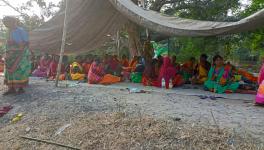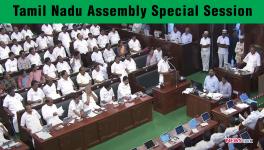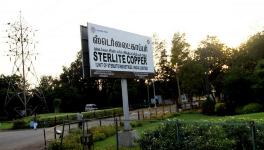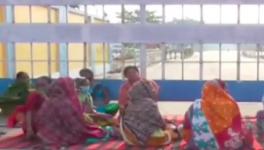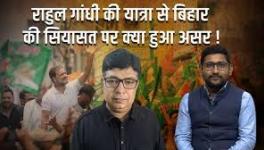Tuticorin Struggle: Madras HC Advocate Defending Jailed Protesters Arrested, Activists Cry Foul
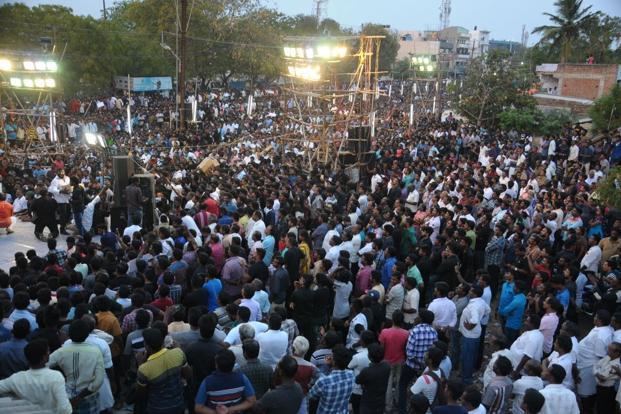
Protests in Thoothukudi against the Sterlite copper plant. Image courtesy: Mint
Advocate S Vanchinathan, an advocate at the Madurai Bench of the Madras High Court – who was providing legal help and defending anti-Sterlite protest groups – was arrested last night by Tamil Nadu police on the charges of instigating violence during protests that took place on May 22 in Tuticorin. The protests were against the expansion of a copper smelting plant, which the locals had alleged, was causing air and water pollution. His petition for anticipatory bail in the Madurai Bench was dismissed by Justice GR Swaminathan.
A total of 13 people were killed in the southern port city in the “targeted” police firing last month, after the agitation turned violent. Owned by London-listed firm Vedanta, the smelter has been shut following the massive agitation.
Vanchinathan, state organiser of the Human Rights Protection Council, was arrested by the Tamil Nadu police at Chennai airport. He had just returned from New Delhi.
Vanchinathan has been very closely associated with the anti-Sterlite movement in Tuticorin, and has been undertaking a number of legal actions through his organisation, along with other lawyers concerned with human rights on a number of people’s issues.
He was appearing for anti-Sterlite protest groups in the Madurai Bench. He reportedly took up their case when they were not given permission to hold protest for three months before May 22 when the incident took place.
He had also reportedly gone to Tuticorin once or twice to appear in local court for hearing of the bail appeal of those who have been arrested in connection with the May 22 protest. Those who know him say that he used to appear at the Madurai Bench or also in the subordinate court.
He has been charged under Section 147 (rioting), 148 (rioting, armed with deadly weapon), 188 (disobedience to order duly promulgated by public servant), 353 (assault or criminal force to deter public servant from discharge of his duty) and 506(2) (threat to cause death or grievous hurt) of the Indian Penal Code (IPC). Section 3 of the Tamil Nadu Property Prevention of Damage and Loss (TNPPDL) Act, 1992, which is an explosives substances act, has also been slapped against him.
Reacting to the arrest, the rights activists and advocates termed the police action a “cowardice act of Tamil Nadu government”. “Killing the innocent unarmed people of Thoothukudi and putting blame on public spirited activist who helped people legally and morally is nothing but a cowardice act of the state government, which enjoys the support of the Bharatiya Janata Party (BJP)-led Centre,” they said in a statement.
“As part of his professional duty, he had gone to the local Tutikorin court to appear for a bail hearing and had met people there. Now, they (the police) have slapped cases against all of them who were supporting the protesters from outside. What the government wants to do is very clear: suppress any form of questioning and protest or opposition against the government functioning,” Advocate (Dr) V Suresh – national general secretary of rights body People’s Union for Civil Liberties (PUCL) – told Newsclick.
Talking about the anti-Sterlite protest, he said it was “very spontaneous” and was a “people’s movement”.
“They (people who were part of the agitation) rejected the support of established political party. They organised themselves around their own independent trusts. This is a very new thing, and it has not happened in North India in recent years. This is the new thing, which is happening in the past four-five years, in Tamil Nadu as well. The number of protesters were massive. The important part of the struggle is its principled position. This was a mass struggle in which young, educated, well aware and well-settled people – who cannot be easily scared – came together, keeping aside political parties. They are very articulate in technology and other thing, but yet they want to take open stand in favour of social justice. Vanchinathan is a part of the set of such youth who have been offering legal help and human rights works,” he said.
Asked whether he smells any conspiracy behind the arrest, he said the coming together of youth is threatening to the police and the government because the latter used to bribe political parties and strike deals.
“By such a crackdown, the government is trying to give a chilling message: those who raise voice against those who have authorities will be put behind the bars and charged with serious offenses so that they have to languish in jails for a long time,” he alleged.
The outside world thinks – said Suresh – that Tamil Nadu is a state of highly educated and is a democratic state, but the reality is completely different. “The reality is Tamil Nadu is actually a police state in which the cops have control over state politics. The ruling party uses the police as striking force. They are – in writing – allowed to do whatever they want,” he alleged.
For the past three months – he added – permission for even a small activity such as holding a public meeting is being rejected, forcing people to approach the court. “Anytime you will have at least 10-15 writ petitions in the court, urging the court to direct the police to give permission for holding protests. It has been happening for a long time even before the death of the (former) Chief Minister J Jayalalitha, but it has gathered momentum in the present regime. It is because they don’t have mandate of the people. By accident of history, they are in power. Secondly, they have close relationship with the BJP, whose hand is visible everywhere – be it Jalli Kattu or protest against methane gas production. The BJP needs to have a puppet government here so that they can get easily 20 MPs from the state in 2019 (general elections),” said Suresh.
When asked about the impact of the arrest on the movement and its future, he said, “People are fighting. When you arrest people, throw them behind the bars, launch a witch-hunt for them by raiding their houses and troubling the women and children, it obviously would have a dampening effect on them. It’s quite natural. But what is not being realised is that it is creating a counter push and people, especially youth, are becoming very resolute to not give up the struggle. So, contrary to the feeling of fear and intimidation, what we are seeing now is growing determination in youngsters that they will fight it out, irrespective of its cost.”
Another rights group People’s Watch – a network towards human rights monitering, intervention, campaign, research and documentation – has called up the National Human Rights Commission as well as the Tamil Nadu Human Rights Commission and the Justice Aruna Jagadesan Commission of Enquiry to “immediately and urgently intervene in this matter and ensure that the no preventive detention law is used against a practicing lawyer and human rights defender based on these frivolous cases pending against him”.
“The charges against him carry the maximum punishment of less than seven years and hence these are not cases where one requires to be remanded – as per the judgement of the Hon’ble Supreme Court of India in the Arnesh Kumar Vs State of Bihar (2014),” said Henry Tiphagne, executive director, People’s Watch.
He said Vanchinathan is not only a lawyer, but a human rights defender engaging in different human rights issues, and enjoys the right to protest, dissent, criticise, associate, express and organise people as a lawyer and human rights defender.
“The police, who find such vocal lawyers an embarrassment to their functioning, will now obtain several PT warrants and register a number of the 239 criminal cases that they already have registered against and show him as an accused in several cases making his coming out on bail difficult,” he feared.
According to the first affidavit filed by the state in the Madras High Court on June 14, Vanchinathan had three criminal cases pending against him – all in Madurai before the Anna Nagar and Tallakulam police station and for offences under Section 143,188, & 341 of the IPC, which are all still in the investigation stage.
But the police say there are eight other cases against Vanchinathan, all in Thoothukudi North, Central, South, SIPCOT and Railway Protection Force, registered in the years 2012, 2015 and 2016. All these cases are in the FIR stage and none of them were chargesheeted till now.
“Even in all these cases, there is no offence for punishment of over seven years in any of the cases. It was only after receiving this additional counter affidavit that the Hon’ble Court was pleased to pronounce dismissal of the anticipatory bail petition but has not found time to deliver the order till now. These events in court speak volumes about the nature of delivery of justice in the state,” he said.
“The UN Basic Principles on the Role of Lawyers of 1990 holds that lawyers have a right to protect citizens and establish their rights and to defend them in all stages of criminal proceedings; that they shall promote programmes to inform the public about their rights and duties under the law and assisting the poor and other disadvantaged persons so as to enable them to assert their rights. The declaration further states that governments shall ensure that lawyers are able to perform all of their professional functions without intimidation, hindrance, harassment or improper interference; are able to travel and to consult with their clients freely both within their own country and abroad; and shall not suffer, or be threatened with, prosecution or administrative, economic or other sanctions for any action taken in accordance with recognized professional duties, standards and ethics. Thus, this case is essentially proof of the Tamil Nadu government’s scant respect to this UN Basic Principle in the arrest of Advocate Vanchinathan,” he concluded.
Get the latest reports & analysis with people's perspective on Protests, movements & deep analytical videos, discussions of the current affairs in your Telegram app. Subscribe to NewsClick's Telegram channel & get Real-Time updates on stories, as they get published on our website.










